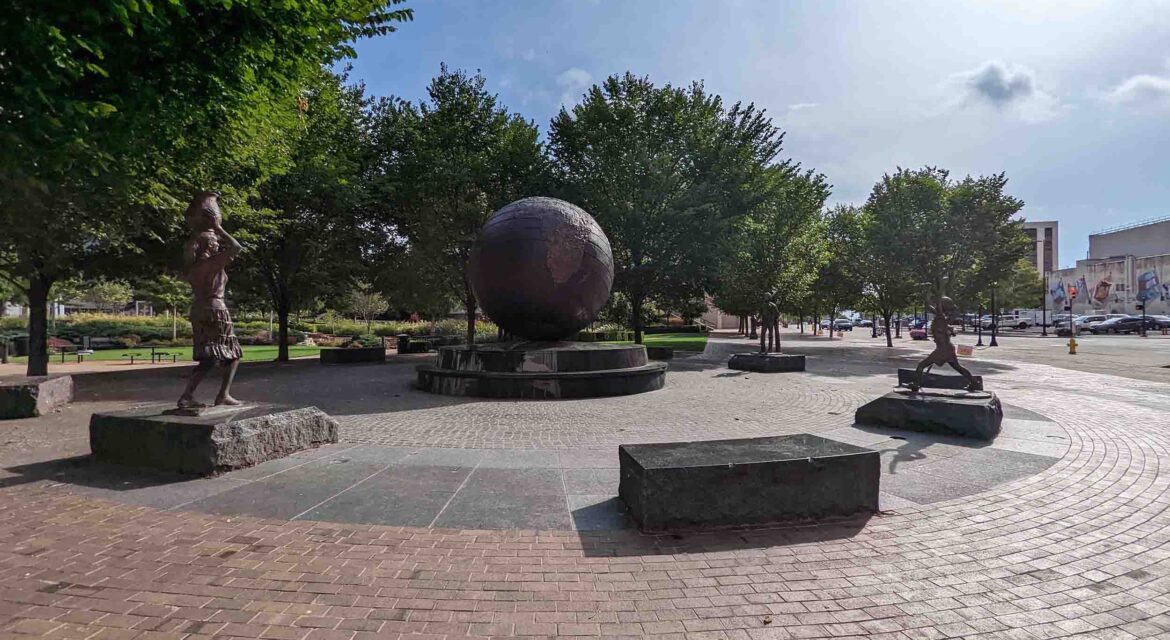 Rotary Plaza has transformed was would otherwise be a plain commercial plaza in Tulsa, Oklahoma. Numerous sculptures, beautiful natural landscapes and engraved granite panels highlight the transformative power of monuments to impact audiences and an entire community.
Rotary Plaza has transformed was would otherwise be a plain commercial plaza in Tulsa, Oklahoma. Numerous sculptures, beautiful natural landscapes and engraved granite panels highlight the transformative power of monuments to impact audiences and an entire community.

Celebrating 100 years of spirit and service
 Williams Center Green is a landscaped park at the foot of BOK Tower, which was built for the Williams Companies. Renovations in 2006 created Williams Center Green which served as a beautifully landscaped park, but an effort to celebrate the centennial of the world’s seventh-largest Rotary Club further transformed it.
Williams Center Green is a landscaped park at the foot of BOK Tower, which was built for the Williams Companies. Renovations in 2006 created Williams Center Green which served as a beautifully landscaped park, but an effort to celebrate the centennial of the world’s seventh-largest Rotary Club further transformed it.
Conceived of in 2007, Rotary Plaza was designed to call to attention Tulsa’s volunteer spirit and the Rotary Club’s role in the community and around the world. The plaza was dedicated to the city of Tulsa as a gift to the city in commemoration of the local Rotary Club’s centennial. Massive panels that tell the story of the city and club are also engraved with the words “Celebrating a Centennial of Service, Tulsa Rotary Club 1915-2015.”
Over 90 feet in diameter, Rotary Plaza is defined by a 12-foot bronze globe that is surrounded by four life-size bronze statues. The sculptures were created by Tulsa artists Jay O’Meilia and David Nunneley, with each representing different aspects of the Rotary Club’s work. The “Serving Tulsa” sculpture shows a Rotarian mentoring an elementary school student. “Freedom from Polio,” depicts a girl tossing aside a pair of crutches. It was designed to highlight the Rotary Club’s fight against the disease and shows. “Drinkable Water for All” show a woman carrying water from a well that was created by the Tulsa Rotary club. Finally, “Peace Through Education” depicts a foreign exchange student holding a book and backpack.
Rotary Plaza is actually the roof of an underground parking garage, further highlighting how the installation of the landmark has positively impacted the space. The million-dollar cost of the landmark was fully funded by the Tulsa Rotary Club and its members, serving as the largest project undertaken by the club and one that will positively impact the present and future of the club and the entire city of Tulsa.

Connecting Tulsa
 Filled with granite benches that allow downtown workers and visitors to enjoy the scenery, Rotary Plaza has become a literal hub that connects some of the most popular areas of Tulsa. This transformation showcases what it can mean for a landmark to redefine how people interact with a space and create experiences in a place that would otherwise be plain or empty.
Filled with granite benches that allow downtown workers and visitors to enjoy the scenery, Rotary Plaza has become a literal hub that connects some of the most popular areas of Tulsa. This transformation showcases what it can mean for a landmark to redefine how people interact with a space and create experiences in a place that would otherwise be plain or empty.

